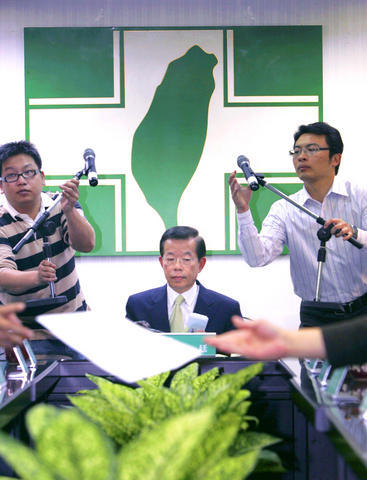Democratic Progressive Party (DPP) presidential candidate Frank Hsieh (謝長廷) resigned as party chairman yesterday, pending the approval of the party's Central Executive Committee, which is to call a meeting today to discuss the matter.
Another meeting will also be called to examine the party's recent election defeats. Recommendations will be presented to a provisional National Congress, the date of which will be decided by the Central Executive Committee today.
Also on the National Congress' agenda is amending the party charter and election rules for party officials.

PHOTO: WALLY SANTANA, AP
DPP Secretary-General Lee Ying-yuan (李應元) told reporters after yesterday's Central Standing Committee meeting that committee members resolved to ask Hsieh to assist the party with its soul-searching and reform program until a new party leader is elected on May 25.
Lee refused to describe the resolution as an attempt to ask Hsieh to stay, saying Hsieh had made it clear that he would not stand in the party chairman election or any race for public office.
Lee said he did not know whether Hsieh would accept the committee's request, but one thing was clear: Hsieh would not accept the offer "if its sole purpose was to get him to stay."
The committee's request came in response to a petition initiated by DPP Legislator Chai Trong-rong (
Hsieh's resignation came on the heels of the DPP's defeat in Saturday's election. It is customary in the DPP for the party chairman to bear responsibility for an election loss by resigning.
Hsieh succeeded President Chen Shui-bian (陳水扁) as party chairman following the DPP's losses in the legislative elections in January.
Saying the party must fully examine its three recent election losses, Hsieh yesterday proposed during the Central Standing Committee meeting that first, the party must assess its position and realize that it is about to become an opposition that "has nothing at all."
"The people do not have the obligation to support the DPP," he said. "If we do not implement a thorough reform, it is possible that we will dissolve in the near future."
Secondly, Hsieh said that the party must solicit more young members and let them participate in the party's reform program and decision-making process.
Thirdly, Hsieh proposed holding a temporary National Congress meeting to let party representatives voice their opinions and discuss the party's future and its course. The party should amend its charter and election rules so younger members can elect the next leader in May, he said.
Finally, Hsieh urged the party to serve as a check on the power of the ruling party, but they should help the Chinese Nationalist Party (KMT) implement good policies, he said.
He also called on president-elect Ma Ying-jeou (
Meanwhile, Hsieh and Presidential Office Secretary-General Yeh Chu-lan (
Hsieh said he did not meet former DPP chairman Shih Ming-teh (
Shih claimed that Hsieh's campaign agreed to force Chen to step down in an attempt to salvage the DPP's election.

A preclearance service to facilitate entry for people traveling to select airports in Japan would be available from Thursday next week to Feb. 25 at Taiwan Taoyuan International Airport, Taoyuan International Airport Corp (TIAC) said on Tuesday. The service was first made available to Taiwanese travelers throughout the winter vacation of 2024 and during the Lunar New Year holiday. In addition to flights to the Japanese cities of Hakodate, Asahikawa, Akita, Sendai, Niigata, Okayama, Takamatsu, Kumamoto and Kagoshima, the service would be available to travelers to Kobe and Oita. The service can be accessed by passengers of 15 flight routes operated by

MORE FALL: An investigation into one of Xi’s key cronies, part of a broader ‘anti-corruption’ drive, indicates that he might have a deep distrust in the military, an expert said China’s latest military purge underscores systemic risks in its shift from collective leadership to sole rule under Chinese President Xi Jinping (習近平), and could disrupt its chain of command and military capabilities, a national security official said yesterday. If decisionmaking within the Chinese Communist Party has become “irrational” under one-man rule, the Taiwan Strait and the regional situation must be approached with extreme caution, given unforeseen risks, they added. The anonymous official made the remarks as China’s Central Military Commission Vice Chairman Zhang Youxia (張又俠) and Joint Staff Department Chief of Staff Liu Zhenli (劉振立) were reportedly being investigated for suspected “serious

ENHANCING EFFICIENCY: The apron can accommodate 16 airplanes overnight at Taoyuan airport while work on the third runway continues, the transport minister said A new temporary overnight parking apron at Taiwan Taoyuan International Airport is to start operating on Friday next week to boost operational efficiency while the third runway is being constructed, the Ministry of Transportation and Communications said yesterday. The apron — one of the crucial projects in the construction of the third runway — can accommodate 16 aircraft overnight at the nation’s largest international airport, Minister of Transportation and Communications Chen Shih-kai (陳世凱) told reporters while inspecting the new facility yesterday morning. Aside from providing the airport operator with greater flexibility in aircraft parking during the third runway construction,

Taiwanese and US defense groups are collaborating to introduce deployable, semi-autonomous manufacturing systems for drones and components in a boost to the nation’s supply chain resilience. Taiwan’s G-Tech Optroelectronics Corp subsidiary GTOC and the US’ Aerkomm Inc on Friday announced an agreement with fellow US-based Firestorm Lab to adopt the latter’s xCell, a technology featuring 3D printers fitted in 6.1m container units. The systems enable aerial platforms and parts to be produced in high volumes from dispersed nodes capable of rapid redeployment, to minimize the risk of enemy strikes and to meet field requirements, they said. Firestorm chief technology officer Ian Muceus said